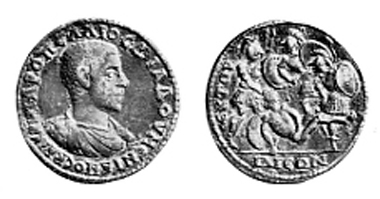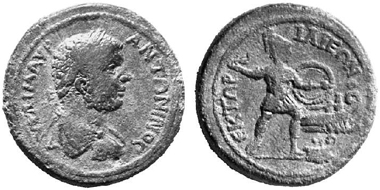In the view of the citizens of the Roman Empire the city of Ilion was more than outstanding. It was successor of ancient Troy, the city of Aeneas, founding father of Rome. Outstanding was Ilion not only due to its venerable age, but its history had proven as well that it was held dear by the gods: as is told by the most famous epos of the Greeks, the Iliad, Zeus, father of the gods, had always supported it because his own son Dardanos was its founder. Of venerable able, loved by the gods and, in addition, via Aeneas mother city of the most powerful city of the world. The inhabitants of the city of Troy had every reason to be proud of their home.
Ilion (Troas), AE, Diadumenian, 217-218. Rev. Hector standing behind slain Patroclus and wards off a Greek. Another warrior tries to walk away with Patroclus. Voegtli, pl. 23j (this specimen). From auction MMAG 41 (1970), no. 376.
Hector was the national hero of the inhabitants of Ilion: a major part of Ilion’s coinage was devoted to the most prominent protagonist of the Trojans. On our example we see him – identified by an inscription to prevent any mistake – fighting a number of Greek heroes. Patroclus is lying on the ground. The Iliad tells us that Hector had confused Patroclus with Achilles. The latter had retreated from the fight since Agamemnon, commander-in-chief of the Greeks, had deliberately taken his booty from him, the slave woman Briseis. And so he sat in his tent and watched the Trojans successfully attacking the Greek ships and setting fire to some of them. Patroclus tried to turn the tide by putting on the armor of Achilles. His plan was to bolster the Greeks up again by pretending that the famous hero intervened in the battle once more. At first, his plan worked out, the Trojans were forced to retreat. Achilles, who was upset by that, pushed Patroclus from behind so that the latter fell on the ground and lost his helmet; Hector dashed against pretended Achilles and killed him. After he had taken his well-earned booty – on the coin we Patroclus lying naked on the ground, without his armor – two Greek warriors attempted to snatch Patroclus’ body away from Hector. The two most probably are Ajax from Locroi and Ajax of Telamon; according to Homer, it was these two who rescued the corpse of Patroclus for the Greeks.
Ilion (Troas), AE, Caracalla, 197-217. Rev. Hector to the right, throwing a torch at the ships of the Greeks. BMC 92, pl. XIII, 9 (rev. same die). From auction Numismatik Lanz 109 (2002), no. 632.
The coinage of Ilion showed its biggest hero, Hector, with pleasure. We see him launching the brand onto Greek ships, rushing ahead in a quadriga or in battle as powerful spearhead. It is as if the entire coinage wanted to make forget the fact that Hector was ultimately defeated by Achilles. Other Ilian Sources of Roman Imperial Times likewise attempted to downplay the victory of the Greeks over the city of Troy and rather emphasized the moments in the Iliad when a Trojan hero prevailed over the Greeks. Despite the account of Pausanias IX.18.5, who told that the body of Hector was conveyed to Thebes at an early date – probably this cult transfer goes back to the contribution of Greek states after 316 to rebuild the destroyed city of Troy –, all love and veneration of the new Trojans was directed at their old hero. Hector possessed a Sacred Grove, a Heroon with his statue, even games in his honor. He was, therefore, firmly fixed in the cultic life of the city of Troy. It was even said that there had been a miracle-working statue of him that took gruesome revenge on a Greek (what else) blasphemer since he had sneered at the image because of the desecration by Achilles who, after all, had dragged Hector’s corpse, tied to his war chariot. Perhaps it wasn’t the image fighting back but the proud Trojans, who beat up the person who had mocked their patron saint.
Something similar had already happened with the dead body of the Greek Ajax. Angry peasants had gathered at the hero’s tomb and sneered at him. To the citizens of Ilion, Ajax, who had committed suicide in a burst of madness, was an absurd antithesis to brave Hector. How was it possible for a people whose army comprised such ludicrous figures to defeat Troy? There was only one explanation: Homer must have got it wrong. And how exactly he had got it all wrong we are told by one of the earliest speeches of Dion Chrysostom. All of the following quotes are taken from his 11th discourse, as translated by J. W. Cohoon.
“36. But the subsequent shift of events, including the death of Hector, which was likely to please his hearers, he did not have in his original plan, nor the final capture of Ilium. For perhaps he (i.e. Homer, author’s note) had not yet planned to turn everything upside down.” Homer hadn’t intended at first to give such a cheeky account of the outcome of the battle between Greeks and Trojans. He was carried away by his own local patriotism and kept the idea in mind that an epos like the Iliad, which showed the Greeks defeating the Asians, may well bolster the Greeks to fight against the Persian enemies. Thus, Dion Chrysostom traced back the ‘true’ events behind the Iliad. He did so with the usual bravura of the Sophists who after all were trained to question in law court speeches the statements of the previous speaker and, with his very allegations, to convict him of lying.
The speech addressing the inhabitants of Troy first of all is a rhetorical firework with which a young, still unknown rhetorician wants to show how good he had learned his trade; actually, so good that that he could even call doyen Homer a liar. From the reluctance of the Dioscuri, the brothers of Helena who didn’t go to war against Troy to rescue the sister, Dion, keen as a razor, concludes that Paris had courted Helena in an honorable way and that the other Greek rulers were only jealous since their courtship hadn’t proved successful.
“53. Thus it was that Paris took Helen as his lawful wife after gaining the consent of her parents and brothers, and took her home with him amid great enthusiasm and rejoicing. And Priam, Hector, and all the others were delighted with the union and welcomed Helen with sacrifices and prayers.”
Soon Dion finds out the true motivation for the Greek campaign: greed; Troy that had equipped courting Paris with such lavish a means that he easily outdid the other Greeks, ought to share its wealth with the rest of the Greek world. Troy, however, was no easy prey. It was not just that brave heroes lived there, but the gods that protected the city remained faithful so that the Greeks were fought off again and again.
The heroics of Hector were so big that Homer couldn’t do otherwise but mention them briefly, although he misjudged the bigger part of it.
“84. However, Homer cannot ignore the story of Hector’s exploits when he routed and pursued the enemy even to the ships, and all the bravest were terror-stricken at the sight of him. Now he compares him to Ares, and again he says that his strength is like that of fire and not a single one dares to confront him, while Apollo stands at his side and Zeus from above signals his approval with wind and thunder.”
Homer had committed falsification of history particularly in regard to the death the Patroclus, as it were. The poet had faced the problem that he, by no stretch of imagination, could conceal his death because in Troy the tomb of Achilles was presented to the public. What would have been more natural than Achilles, biggest of all Greek heroes, had been killed by the biggest warrior of the Trojans, Hector. But no, the Greek national pride didn’t allow that. Achilles could only be killed with the assistance of a god, Apollo. Since, however, Hector without any doubt possessed the armor of Achilles – which in antiquity marked a victory over an enemy – a second Achilles had to be slipped, Patroclus who merely wore his friend’s armor.
“103 et seq. Now it was Homer’s especial aim to throw a veil over the death of Achilles and create the impression that he did not die at Troy; but seeing the impossibility of this, since the tradition prevailed and his tomb was being pointed out, Homer, suppressing the account of his death by Hector’s hand, makes the contrary statement that the latter, who was so far superior to all other men, was slain by Achilles, adding that his corpse was dishonoured and dragged as far as the walls.”
Hence, there was no way that Hector could have been killed by Achilles; instead, he became the King of Troy after the death of his father.
“124. Hector too died full of years at the end of a long reign after subduing most of Asia, and was buried outside the city.”
Of course, the citizens of Troy liked to listen to the youthful sophist who proved to them that they – in accordance with what they had depicted on their coins all along – had never been defeated by the Greeks. Admittedly, most people realized that they were just listening to a perfectly composed masterpiece of a rhetorician. What’s the difference? The Trojans did the same as many cities in Asia Minor who traced their genealogy back to the gods, against their better judgement, and played a part in the mythical events of prehistory. The inhabitants of Troy were simply unlucky living in a place whose myth was told in every detail by one of the most famous authors of ancient times to the effect that even repetitious whitewashing couldn’t change the “facts” familiar to every person possessing a Greek education.







